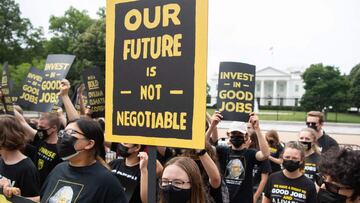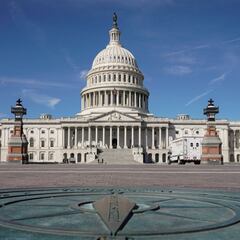What has Joe Biden said about climate change in the US?
In a speech this week, President Biden reiterated the threat global climate change poses to the United States and its allies. But what actions has the President taken?


Leading climate scientists have spoken, and according to the International Governmental Panel on Climate Change (IPCC), the global community has less than ten years to reduce emissions in a meaningful way before the irreparable damage is done to the earth’s environment. In 2018 the IPCC warned that global emissions must be cut in half to keep warming below 1.5 degrees celsius. If the temperatures rise above the 1.5 thresholds, sea levels could increase more than a foot, crop yields in the tropics could reduce by three percent, and between seventy to ninety percent of coral reefs could be lost.
These outcomes could lead to starvation and mass migration as land becomes inhabitable and coral reefs, an essential source of livelihood and food for billions of people, are lost. The report also warns that the consequences become even more dier if global temperature surpasses two or even three degrees Celsius. With the lack of action being taken by the US and other major polluters, in recent years, keeping levels under 1.5 seems increasingly unlikely.
WRI drew up infographics explaining the IPCC 1.5 C report https://t.co/SkVmTSoEiC #Drewit #climate #SR14 pic.twitter.com/La2xGzjvmh
— WRI Climate (@WRIClimate) October 10, 2018
In a speech to service members on 9 June, President Biden described a meeting with top military officials in 2009, where they warned that global warming was the greatest physical threat to the United States. As natural resources become more scarce, conflict globally could increase, and that to protect the United States, its allies, and those most vulnerable to the effects of climate change, serious action needed to be taken.
.@POTUS: "We build on that commitment with a revitalized Atlantic Charter updated to reaffirm that promise while speaking directly to the key challenges of this century - cybersecurity, emerging technologies, global health, and climate change." https://t.co/zGkiXveO0e pic.twitter.com/dtFRvr7HZl
— The Hill (@thehill) June 10, 2021
The US military has not been shy to voice its concerns. A 2019 report released by the Pentagon under President Trump warned that almost eighty military installations across the US faced threats caused by change weather patterns and that the agency’s ability to conduct missions globally will become increasingly difficult as the climate changes. In the report, the Department of Defense stated that they had already begun "incorporating climate resilience as across-cutting consideration for our planning and decision-making processes, and not as a separate program or specific set of actions.”
On the campaign trail, then candidate-Biden acknowledged that climate change is an existential threat to human existence and that if elected, his administration would act quickly to address the crisis. Since taking office, President Biden has worked to re-establish the US as a leader on this issue, but much credibility was lost under the previous administration.
Within the first hundred days of his presidency, Biden hosted a virtual climate summit with forty world leaders. During the conference, which took place on 22 April, President Biden outlined his vision for a greener country and pledged to set the United States on a path to net-zero carbon emissions by 2050, beginning by cutting emissions in half by the end of this decade. While these ambitious targets were applauded, many leaders, activists, and climate scientists are waiting to see whether concrete steps will be taken before following the US' lead in this sector.
American Jobs Plan and Climate
The announcement to cut greenhouse gas emissions in half came as a surprise to many in Washington and around the world. However, as President, Biden has little power to enact the changes necessary to set the country on the path to meet this target. For that reason, Biden has included measures to reduce emissions in his infrastructure plan called the American Jobs Plan.
In addition to the emission mitigation measures included in the American Jobs Plan, the proposal would make critical investments in the nation’s infrastructure to adapt to the effects of climate change. The White House has stated that the plan would help support the millions of Americans that are already feeling the effects of climate change. The President emphasized the need for the investment as last year the country “faced 22 extreme weather and climate-related disaster events with losses exceeding $1 billion each – a cumulative price tag of nearly $100 billion.”
Negotiations between the White House and Republicans have stalled in recent weeks, making the prospects of passing the sweeping legislation with bipartisan support unlikely. The President is scheduled to continue discussions with Senator Shelley Moore Capito of West Virginia who serves as the Ranking Member of the Environment and Public Works Committee this week. In April, Senator Moore Capito unveiled a counter-proposal to the American Jobs Plan, which was about a quarter of the size.
Although the Republican plan did include some funding for climate resilience and adaptation, the value pales compared to that of the President's. As prospects of a comprise have deteriorated, with conflicts overspending on climate becoming a serious obstacle, prominent Democrats including Senators Ed Markey, and Representative Alexandria Ocasio Cortez have made their position clear -- “no climate, no deal.” Senator Markey has publicly stated his disappointment with his colleagues on the right and warned that “The planet cannot survive another successful Republican obstructionist strategy.”
A smaller infrastructure package means less climate action, fewer jobs, less recovery, and less investment in America’s future. A smaller package can be translated into two words: climate denial.
— Ed Markey (@SenMarkey) June 10, 2021
No climate, no deal.
Related stories
Additionally, Senator Martin Heinrich of New Mexico has noted the importance of the US taking concrete action before the Glasgow global climate summit in November. The Conference of the Parties on Climate Change takes place each year but was unable to be hosted in 2020 due to the pandemic. This year is especially important as countries will be encouraged to double down on the commitments they made in 2015 when signing the Paris Climate Accords. The Senator stated that “If President Biden wants to establish credibility before he goes to Glasgow later this year, we need to do this, that we need to do it big and meaningful.”
However, with negotiations nearing collapse and more conservative members of the Democratic caucus still not on board, the likelihood of getting the proposal through Congress seems increasingly unlikely in the coming months.

